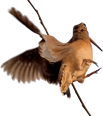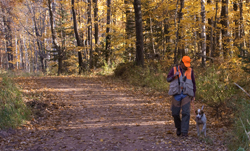A duck hunt on a southwest Georgia plantation
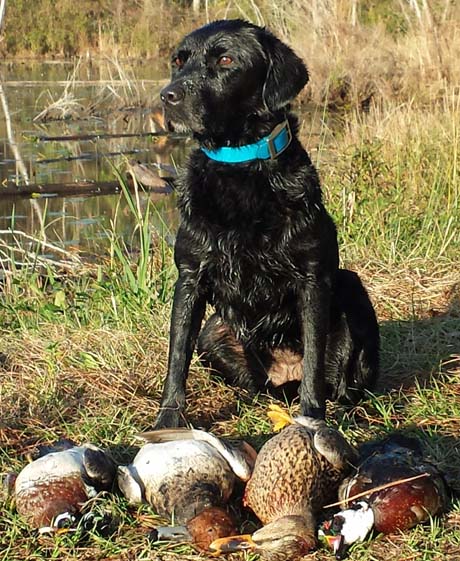
May, our 10-year-old Labrador, poses with part of her retrieved stash of ducks.
Not unlike bobwhite quail hunts, duck hunting on a southwest Georgia plantation is a complicated, carefully orchestrated, social event. In addition, preparation for the actual hunt begins months prior to the season.
Most duck hunting is done in ponds specially created by digging or damming. In spring, those ponds are drained so corn or millet can be planted in the dry beds. The ponds are re-filled in fall so ducks can easily feed on the heads of the crops.
Various camouflaged blinds are installed. Some are half-submerged, wooden structures with a below-water platform (hunters wear chest waders) and an above-water, dry ledge for shells and gear. Other blinds are built on stilts above the water, complete with walkways from land.
In this far southwest corner of Georgia, ducks could have arrived via either the Atlantic or Mississippi Flyways and include wood ducks, mallards, redheads, pintails and ring-necked ducks.
Betsy and I are renting a small cottage and kennels which is part of plantation. One evening, Langdon, the plantation’s owner, called and invited me on Saturday morning duck hunt. I eagerly agreed and Langdon then asked, “Does your Lab retrieve? Bring her.”
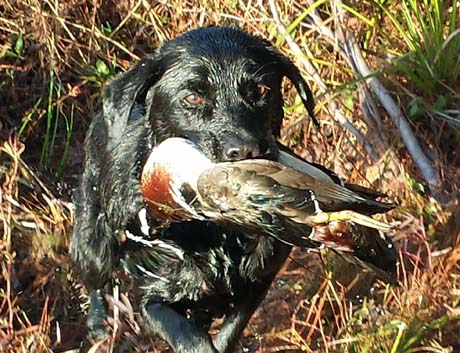
May clambers on shore with her retrieve of a colorful drake wood duck.
This would be May’s debut as a duck retriever. She is a great upland flushing dog and has been on countless hunts and training sessions with pointers and setters. And she’s always loved to retrieve. Betsy began throwing dummies for May when she was a puppy and has continuously played fetch in many lakes and ponds. We bought her from Dennis and Janice Anderson, who specialize in Labradors out of British stock.
So early the next morning, I gathered my clothes, shotgun and loaded May into the truck. Langdon, a group of friends and family members and I gathered at 6:00 a.m. at the plantation’s lodge for coffee and planning. Licenses and duck stamps were verified; steel shot inspected; and, most importantly, hunters were assigned partners and blinds in one of three ponds. By 6:30, we were heading to our blinds.
Just as it was getting light, about 7 a.m., the wood ducks started to come in from a large body of water to the east. The ducks were easy to spot but not so easy to shoot because they were backlit by the sun. The action was hot and heavy for brief time, though, and several woodies hit the water after good shots. Later ring-necked ducks, mallards and a few redheads trickled into our pond, along with some coots and mergansers. By 9:30, the sun was up, the sky had turned blue and the hunt was over.
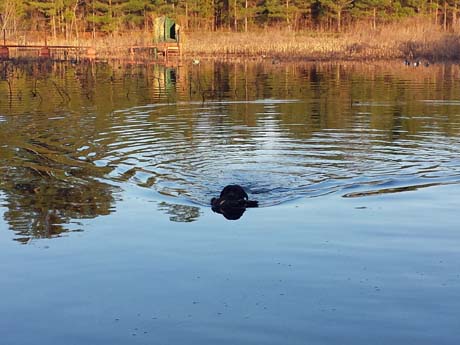
In the gathering light, May swims in with an easy retrieve of a floating duck. An elevated duck blind on the far shore is connected to land by a walkway.
Ducks aren’t retrieved during the hunt. Instead, they’re marked and picked up afterwards using hunters in waders and boats or dogs. So it was time for May and an English cocker spaniel owned by Langdon’s son to get to work.
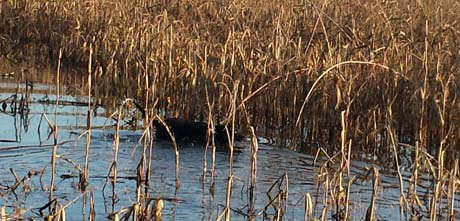
May hunts for downed ducks in a corn stubble near the shore. Duck ponds in southwestern Georgia are drained and planted with corn or millet in the spring and then flooded in the fall.
With just a little encouragement, May took to it, well, like a duck to water! She first retrieved six, clearly visible, floating ducks. Several others were marked down in the corn stubble and I sent her out. May searched, using her nose, and swam back and forth several times with successful retrieves. She is now a great duck retriever!
Like many events at a plantation, hospitality plays a big part. After all retrieving was complete, hunters again gathered in the lodge to feast on a big Southern breakfast of eggs, sausages, bacon, grits, biscuits, fruit and more coffee.

